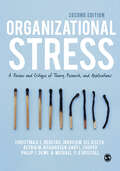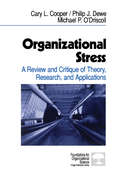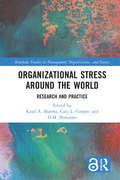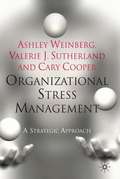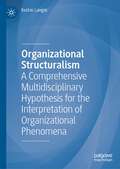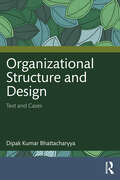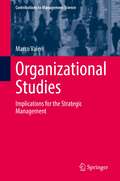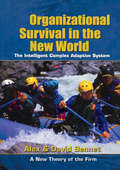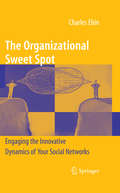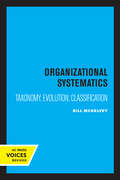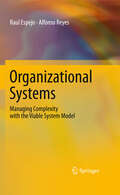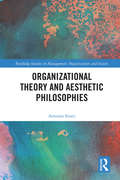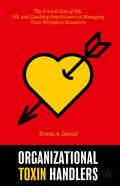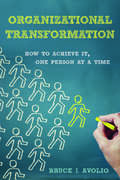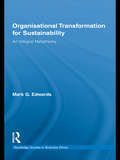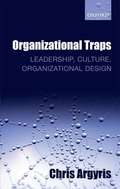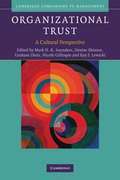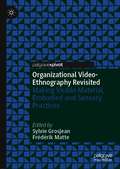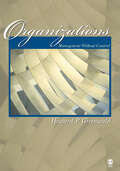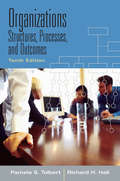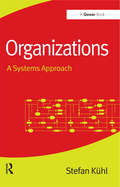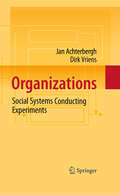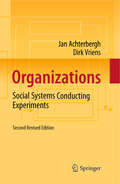- Table View
- List View
Organizational Stress: A Review and Critique of Theory, Research, and Applications
by Cary L. Cooper Philip J. Dewe Christina G. Nerstad Ingvild M. Seljeseth Astrid M Richardsen Michael P O′DriscollWhat price do organizations and nations pay for a poor fit between employees and their work environments? Negative stress imposes a high cost on individual health and well-being as well as organizational health and productivity. This comprehensive textbook examines the definitions of job-related stress and the methods used to assess levels and consequences of occupational stress, along with strategies that may be used by individuals and organizations to confront negative stress and its associated problems. From sources of stress to organizational interventions, and from job-related burnout to coping with stress, Organizational Stress gives the reader – whether researcher, student, or practitioner – a basis for tailoring work environments which contribute to the health and well-being of individuals, organizations, and even the societies in which they live. This new edition has been updated to reflect the most relevant research in the field of organisational stress, including a completely new chapter on stress and the brain. It also focusses on the future of work in our rapidly changing world – dealing with contemporary contexts such as the COVID-19 pandemic and the rise of the gig economy. Christina G.L. Nerstad is a Professor at BI Norwegian Business School Ingvild M. Seljeseth is an Associate Professor at Kristiania University College Astrid M. Richardsen is Professor Emerita at BI Norwegian Business School Cary L Cooper is a Professor at Alliance Manchester Business School Philip J. Dewe is Emeritus Professor at Birkbeck, University of London Michael P. O′Driscoll is Emeritus Professor at University of Waikato
Organizational Stress: A Review and Critique of Theory, Research, and Applications
by Dr Cary P. Cooper Dr Philip J. Dewe Dr Michael P O'DriscollThis book examines stress in organizational contexts. The authors review the sources and outcomes of job-related stress, the methods used to assess levels and consequences of occupational stress, along with the strategies that might be used by individuals and organizations to confront stress and its associated problems. One chapter is devoted to examining an extreme form of occupational stress--burnout, which has been found to have severe consequences for individuals and their organizations. The book closes with a discussion of scenarios for jobs and work in the new millennium, and the potential sources of stress that these scenarios may generate.
Organizational Stress Around the World: Research and Practice (Routledge Studies in Management, Organizations and Society)
by Cary L. Cooper Kajal A. Sharma D. M. PestonjeeStress is defined as a feeling experienced when a person perceives that demands exceed the personal and social resources the individual is able to mobilize. It can occur due to environmental issues, such as a looming work deadline, or psychological, for example, persistent worry about familial problems. While the acute response to life-threatening circumstances can be life-saving, research reveals that the body’s stress response is largely similar when it reacts to less threatening but chronically present stressors such as work overload, deadline pressures and family conflicts. It is proffered that chronic activation of stress response in the body can lead to several pathological changes such as elevated blood pressure, clogging of blood vessels, anxiety, depression, and addiction. Organizational Stress Around the World: Research and Practice aims to present a sound theoretical and empirical basis for understanding the evolving and changing nature of stress in contemporary organizations. It presents research that expands theory and practice by addressing real-world issues, across cultures and by providing multiple perspectives on organizational stress and research relevant to different occupational settings and cultures. Personal, occupational, organizational, and societal issues relevant to stress identification along with management techniques/approach to confront stress and its associated problems at individual and organizational level are also explored. It will be of value to researchers, academics, practitioners, and students interested in stress management research.
Organizational Stress Management
by Ashley Weinberg Valerie J. Sutherland Cary CooperIncluding practical advice on how to conduct a stress audit and how to target stress 'hot spots' within an organization, Organizational Stress Management provides a fresh strategic model for the manager concerned with the negative effects stress can have both on company performance and the quality of life of individuals at work.
Organizational Structuralism: A Comprehensive Multidisciplinary Hypothesis for the Interpretation of Organizational Phenomena
by Kostas LangasIn an era in which leadership and change management models, tools and development schemes based on soft skills constitute mainstream thought, it has become ever more necessary to develop a scientific and rigorous approach to the life of an organization that can overcome the challenges of different cultural approaches and socio-environmental limitations. In this ground-breaking new book, the author puts forward a universal model for designing an organization. The model is based upon first principles, theoretical properties as well as empirical approaches to organizational development so as to form a new model under the name of “Organizational Structuralism”. By deploying this new model, the author argues that organizations will be able to design a new organization from its foundations, improve and change fundamental organizational structures, define and fine-tune key performance indicators and enhance their competitive advantages. Additionally, the model proposed in this book will allow practitioners to be able to respond effectively and efficiently to every disruptive or non-continuous evolutionary change caused either by the digital transformation or by geopolitical of organizations.
Organizational Structure and Design: Text and Cases
by Dipak Kumar BhattacharyyaThis textbook explores major issues and concepts in organizational structure and design. It details strategic and business issues that merit consideration while framing or designing the organizational structure.Working with a range of industry examples and case studies, this volume: Relates organizational structure and design issues with organizational culture and change management, power and politics, and policies and strategies Covers several key topics, including the structure-strategy debate, viable system model, issues pertaining to organizational culture, change management, power, and conflict Discusses various models of organizational structure like matrix, global business unit, strategic business unit, hybrid, functional and divisional, modular, networked, agile, helix, etc., in relation to organizational practices and their strategic influence over the organization Enables readers to challenge organizational design in times of uncertainty Concise, lucid, and engaging, this book will be useful to students, academics, management researchers, and industry professionals in the fields of general management, organizational behaviour, and human resource management and development.
Organizational Studies: Implications for the Strategic Management (Contributions to Management Science)
by Marco ValeriThis book focuses on the discussion and analysis of theory and behavior in organizations in all industries and sectors worldwide. It analyzes the subject of business administration and highlights its evolution, which is closely linked to the frequent and far-reaching changes in the social, economic and technological settings in which it operates.By way of introduction, a historical outline shows how technological progress has sparked profound changes in the economic, social and technological context, making organizations constantly evolving structures. On this basis, the book addresses knowledge management and organizational theories that consider knowledge and training to be companies’ most important resources for facing the substantial challenges posed by the current international context.The book broadens readers’ understanding of the operating principles of business management and their awareness of the structure and implementation of various organizational models. As such, it will be of interest to scholars and professionals in the fields of strategic management and organizational behavior.
Organizational Survival in the New World
by Alex Bennet David BennetIn this book David and Alex Bennet propose a new model for organizations that enables them to react more quickly and fluidly to today's fast-changing, dynamic business environment: the Intelligent Complex Adaptive System (ICAS). ICAS is a new organic model of the firm based on recent research in complexity and neuroscience, and incorporating networking theory and knowledge management, and turns the living system metaphor into a reality for organizations. This book synthesizes new thinking about organizational structure from the fields listed above into ICAS, a new systems model for the successful organization of the future designed to help leaders and managers of knowledge organizations succeed in a non-linear, complex, fast-changing and turbulent environment. Technology enables connectivity, and the ICAS model takes advantage of that connectivity by fostering the development of dynamic, effective and trusting relationships in a new organizational structure. This book outlines the model in chapter four, and then breaks down the model into its components in the next two chapters. This is a benefit to readers since different components of the model can be implemented at different times, so the book can guide implementation of one or all of the components as a manager sees fit. There are eight characteristics of the ICAS: organizational intelligence, unity and shared purpose, optimum complexity, selectivity, knowledge centricity, flow, permeable boundaries, and multi-dimensionality.
The Organizational Sweet Spot
by Charles EhinEmployee disengagement is one of the most pressing problems plaguing managers today hampering the innovation capacities of countless organizations. According to recent polls, some 20 percent of workers report feeling disconnected from their jobs, in an environment of stagnating wages, massive layoffs, rising health care costs, and other factors that contribute to alienation, distrust, and apathy. In The Organizational Sweet Spot, Dr. Charles Ehin takes a refreshing new look at what it will take to reengage disaffected workers and boost their resolve to advance novel ideas. Applying the latest research from such fields as evolutionary psychology, social neuroscience, organizational behavior, anthropology, and social network analysis, Ehin demonstrates how employee disengagement is rooted in a fundamental misalignment between people's instinctive drive to develop their personal and group identities through informal or "emergent" relationships and the ways in which organizational goals and profit motives are executed through formal bureaucracy. The challenge for today's organizations--which operate under constantly changing conditions--is to narrow this gap, that is, to find the "sweet spot", where the formal and informal elements of the organization overlap. Ehin provides practical tools for leaders to support this "shared access domain" to improve productivity, catalyze innovation, and inspire exceptional performance. His new model is likely to reverberate throughout current management thinking as we move toward creating more vital and meaningful workplaces.
Organizational Systematics: Taxonomy, Evolution, Classification
by Bill McKelveyThis title is part of UC Press's Voices Revived program, which commemorates University of California Press’s mission to seek out and cultivate the brightest minds and give them voice, reach, and impact. Drawing on a backlist dating to 1893, Voices Revived makes high-quality, peer-reviewed scholarship accessible once again using print-on-demand technology. This title was originally published in 1982.
Organizational Systems: Managing Complexity with the Viable System Model
by Alfonso Reyes Raul EspejoOrganizational Systems clarifies the application of cybernetic ideas, particularly those of Beer's Viable System Model, to organizational diagnosis and design. Readers learn to appreciate the relevance of seeing the systemic coherence of the world. The book argues that many of the problems we experience today are routed in our practice of fragmenting that needs to be connected as a whole. It offers a method to study and design organizations and a methodology to deal with implementation problems. It is the outcome of many years of working experience with government offices as well as with all kinds of public and private enterprises. At a more detailed level this book offers an in depth discussion of variety engineering that is not available either in the primary or secondary literature.
Organizational Technology for Knowledge Workers
by Thomas H. DavenportTechnology has been perhaps the single most important intervention in knowledge worker performance over the past couple of decades. The advent of personal computers, personal productivity software, personal digital assistants, mobile technologies, and other applications for the support of knowledge work has transformed it considerably. But it is not always safe to assume that these technologies have enhanced knowledge worker productivity. This chapter describes how technologies at the organizational level have impacted different types of knowledge work. This chapter is excerpted from "Thinking for a Living: How to Get Better Performance and Results from Knowledge Workers."
Organizational Theory and Aesthetic Philosophies (Routledge Studies in Management, Organizations and Society)
by Antonio StratiDiverse philosophies constitute the theoretical ground of the study of the aesthetic side of organization. In fact, there is not a single unique philosophy behind the organizational research of the aesthetic dimension of organizational life. Organizational Theory and Aesthetic Philosophies will illustrate and discuss this complex phenomenon, and it will be dedicated to highlight the philosophical basis of the study of aesthetics, art and design in organization. The book distinguishes three principal "philosophical sensibilities" amongst these philosophies: aesthetic, hermeneutic and performative philosophical sensibility. Each of them is described and critically assessed through the work of philosophers, art theorists, sociologists and social scientists who represent its main protagonists. In this way, the reader will be conducted through the variety of philosophies that constitute a reference for aesthetics and design in organization. The architecture of the book is articulated in two parts in order to provide student and scholars in philosophical aesthetics, in art, in design and in organization studies with an informative and agile instrument for academic research and study.
Organizational Toxin Handlers: The Critical Role of HR, OD, and Coaching Practitioners in Managing Toxic Workplace Situations
by Teresa A. DanielThis book examines the important role of HR practitioners acting as toxin handlers within their organizations and the dangers they face when dealing with toxic workplace emotions caused by difficult organizational decisions, such as mergers and acquisitions, staff reductions, and restructurings. Exploring what they do, why they do it, and the personal and professional rewards created by the work, it also examines the dangers that await them in terms of risks to their personal well-being. In today's world, layoffs, harassment, discrimination, personality conflicts, or an abusive boss are just a few of the many types of workplace situations that can generate intense emotional pain for employees—feelings like anger, frustration, stress, disappointment, and even fear. Unfortunately, these types of events are predictable and somewhat inevitable, but it is the way organizations handle them—or do not—that can create a serious problem for employees. The responsibility often falls to HR to help troubled employees reduce their emotional pain so that they can re-focus and get back to work as quickly as possible, resulting in positive organizational outcomes. This book highlights the balancing act that HR must perform of caring for employees and championing their causes while at the same time driving toward organizational goals set by senior leaders. The author demonstrates how toxin handlers reduce organizational pain during tough times while also exploring the costs to their own well-being. Readers will learn to minimize the negative impact of toxic emotions from an organizational as well as individual perspective. This book will teach HR professionals strategies about how to anticipate and navigate the organizational toxicity caused by some of the inevitable and difficult people-related situations that are likely to come their way.
Organizational Transformation: How to Achieve It, One Person at a Time
by Bruce J. AvolioIt is estimated that approximately seventy percent of organizations fail in their attempts to implement transformative change. This book will help lessen that rate. Using real-world examples, Bruce J. Avolio maps four states of change that any organization must go through: identifying and recognizing, initiating, emerging and impending, and institutionalizing new ways of operating. Each state is described in detail, as are the leadership qualities necessary to solidify and transition from one to the next. These "in-between moments" are an often-overlooked key to organizational transformation. So too is the fact that organizational change happens one individual at a time. For transformation to take root, each person must shift his or her sense of self at work and the role that he or she plays in the transforming organization. Intended as a road map, rather than a "how-to" manual with fixed procedures, Organizational Transformation will help leaders to locate their organization's position on a continuum of progress and confidently navigate planned, whole-systems change, overcoming the challenges of growing from and adjusting to watershed moments.
Organizational Transformation for Sustainability: An Integral Metatheory (Routledge Studies in Business Ethics)
by Mark EdwardsDuring the 21st century organizations will undergo a level of radical and global change that has rarely been seen before. This transformation will come as a result of the environmental, social and economic challenges that now confront organisations in all their activities. But are our understandings and theories of change up to the task of meeting these challenges? Will we be able to develop sustaining visions of how organizations might contribute to the long-term viability of our interdependent global communities? Organizational Transformation for Sustainability: An Integral Metatheory offers some innovative answers to the big questions involved in organizational sustainability and the radical changes that organizations will need to undergo as we move into the third millennium. This new approach comes from the emerging field of integral metatheory. Edwards shows how a "Big Picture" view of organisational transformation can contribute to our understanding of, and search for, organisational sustainability. There are four key themes to the book: i) the need for integrative metatheories for organisational change; ii) the development of a general research method for building metatheory; iii) the description of an integral metatheory for organisational sustainability; and iv) the discussion of the implications of this metatheory for organisational change and social policy regarding sustainability. This book brings a unique and important orienting perspective to these issues.
Organizational Traps: Leadership, Culture, Organizational Design
by Chris ArgyrisThis book argues that whatever theory is used to describe and understand such organizational traps should be used to design and implement interventions that reduce and prevent them. Argyris is one of the world's leading management scholars whose work has consistently shed light on organizational problems. This book is essential reading for MBAs, managers, and consultants.
Organizational Traps: The Madness--and the Wisdom--of Crowds
by Richard LueckeGroups can sometimes take on characteristics and dynamics that impede individual decision making. Being aware of how susceptible you and your colleagues are to powerful social influences is important. This chapter examines several ways in which groupthink and other social influences can infect a logical decision process.
Organizational Trust: A Cultural Perspective
by Mark N. K. Saunders Denise Skinner Graham Dietz Nicole Gillespie Roy J. LewickiThe globalized nature of modern organizations presents new and intimidating challenges for effective relationship building. Organizations and their employees are increasingly being asked to manage unfamiliar relationships with unfamiliar parties. These relationships not only involve working across different national cultures, but also dealing with different organizational cultures, different professional cultures and even different internal constituencies. Managing such differences demands trust. This book brings together research findings on organizational trust-building across cultures. Established trust scholars from around the world consider the development and maintenance of trust between, for example, management consultants and their clients, senior international managers from different nationalities, different internal organizational groupings during times of change, international joint ventures, and service suppliers and the local communities they serve. These studies, set in a wide variety of national settings, are an important resource for academics, students and practitioners who wish to know more about the nature of cross-cultural trust-building in organizations.
Organizational Video-Ethnography Revisited: Making Visible Material, Embodied and Sensory Practices
by Sylvie Grosjean Frédérik MatteThis book explores the undeveloped potential of video-ethnography to study the material, embodied and sensory dimensions of workplace practices. With the growing interest in sociomateriality and the development of research on the embodied and sensory dimensions of organizational practices, some methodological challenges of this type of research need to be addressed. The main purpose of this book is to present various forms of video-ethnography that make organizational phenomena visible and help better appreciate the organizing properties of bodies, affects, senses and spaces in workplace practices. To do so, illustrative cases based on video-ethnography was discussed to understand how experiential and unspoken ways of knowing produced through a video-based approach can be made meaningful and relevant to study the material, embodied and sensory dimension of work practices. This book is addressed to researchers and students in social sciences and organizational studies and offers a methodological reflection on how to study the material, embodied, and sensory dimensions of organizational life.
Organizations: Management Without Control
by Howard P. GreenwaldOrganizations: Management Without Control provides a comprehensive understanding of the functions of formal organizations and the challenges they face. The most effective organizations provide members with opportunities to achieve their personal goals while pursuing the organization′s objectives. Using a practical approach with minimal jargon, author Howard P. Greenwald covers the basic features of organizations such as roles, structure, reward systems, power and authority, and culture and introduces important theoretical perspectives related to these features.Key FeaturesEmphasizes the theme of "management without control": This volume differs from most standard texts by highlighting both the challenges and opportunities that result from the independence of the individuals in the organization′s ranks.Stresses the importance of individual motivation and self-fulfillment: Recognizing the individual′s responsibility for their own success, the book helps readers evaluate clues to whether the organization to which they belong is an adequate opportunity.Offers a critical perspective on current fads and management ideologies: Proposing no formulaic solutions, the book provides the perspectives required to understand each organization′s uniqueness and to develop remedies to issues as they arise.Makes theory accessible through numerous real-life examples: Chapters include examples from life in business organizations, government agencies, non-profits, clubs, friendship groups, and families. Examines multinational corporations: Challenges involved in management on an international scale are explored as the book applies the principle of individual and group independence to global matters.Underscores multidisciplinary interest in organizations: Content is drawn from sociology, social psychology, anthropology, and management science.Intended AudienceThis introductory textbook on formal organizations is designed for advanced undergraduate and graduate courses such as Organizational Behavior, Managing Complex Organizations, Sociology of Organizations, and Government/Non-profit Management in the departments of business, public administration, health administration, social work, sociology, and psychology.Instructor′s ResourcesAn Instructor′s Resource CD is available upon request. This CD provides PowerPoint presentations, test questions, additional examples and cases, suggested exercises, and much more!
Organizations: Structures, Processes and Outcomes (Oxford Handbooks In Business And Management C Ser.)
by Charles HarperBased upon classical and contemporary theory and empirical research, this text forms a sociological analysis of organizations, focusing on the impacts that organizations have upon individuals and society.
Organizations: A Systems Approach
by Stefan KühlFrom businesses, public administrations, universities and schools, to hospitals, prisons, political parties, or the military, peoples’ lives are inextricably bound up with organizations from cradle to grave. Yet we receive little training in how - as members, customers, voters, or patients - to deal with them. In Organizations Stefan Kühl asks and answers many questions. What are these entities that wield such strong influence in our society? What makes them tick? What are our options for intervening, either from within or without? This book explains how organizations function by examining their three central features: their purposes or goals, their hierarchies, and their memberships. The author presents the three aspects of organizations - the display, formal, and informal aspects, explaining them in metaphorical terms as façades, machines, and games. Acknowledging that the seminal systems theory developed by sociologist Niklas Luhmann is not easily accessible, Professor Kühl presents Luhmann’s organizational concept in a succinct and user-friendly form that will be readily grasped by a practitioner audience and provides new insights in this ambitious theory.
Organizations: Social Systems Conducting Experiments
by Dirk Vriens Jan AchterberghWhat are organizations? What is their point? How should one design successful organizations? Although these questions have been treated by many authors in many different ways, this book offers a new perspective. In a nutshell, the book combines cybernetics, social systems theory and Aristotle's ethics to describe organizations as "social systems conducting experiments with their survival" and to formulate principles for their design. In Part I, the authors argue that 'experimenting' and 'social interaction' are key features of organizations. In order to survive, organizations continuously have to experiment with goals, infrastructures and transformation processes and this experiment is an inherently social activity. In Part II principles are given guiding the design of organizational infrastructures. In Part III Aristotle's ethics, cybernetics and social systems theory are instrumental to describe and derive design principles required for social responsibility.
Organizations: Social Systems Conducting Experiments, 2nd Revised Edition
by Dirk Vriens Jan AchterberghWhat are organizations? What is their point? How should one design successful organizations? Although these questions have been treated by many authors in many different ways, this book offers a new perspective. In a nutshell, the book combines cybernetics, social systems theory and Aristotle's ethics to describe organizations as "social systems conducting experiments with their survival" and to formulate principles for their design. In Part I, the authors argue that 'experimenting' and 'social interaction' are key features of organizations. In order to survive, organizations continuously have to experiment with goals, infrastructures and transformation processes and this experiment is an inherently social activity. In Part II principles are given guiding the design of organizational infrastructures. In Part III Aristotle's ethics, cybernetics and social systems theory are instrumental to describe and derive design principles required for social responsibility.
